MercoPress. South Atlantic News Agency
Tag: Jorge Larrañaga
-
Monday, June 2nd 2014 - 07:13 UTC
Vazquez, Lacalle Pou and Bordaberry: one the three will be Uruguay's next president

Sunday's primaries in Uruguay cleared the way for the candidates of the four parties with legislative representation that will be disputing the presidential election next October 26, with a run-off a month later if none of them manages 50% plus one of ballots.
-
Friday, May 30th 2014 - 05:19 UTC
Uruguay parties chose presidential candidates in next Sunday's primaries

Uruguay closed on Thursday the primaries election campaign ahead of Sunday's vote when the different parties will be choosing their candidates for the big presidential contest on the last Sunday of October. Whoever is elected in October or in the November run-off will succeed President Jose Mujica on March 2015.
-
Wednesday, March 19th 2014 - 07:30 UTC
A Vazquez victory forecasted in Uruguay but with 'orthodox economics' threatened
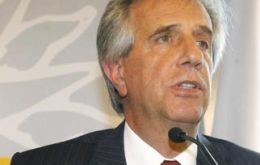
The Economist Intelligence Unit anticipates a 2015 scenario in which Tabaré Vazquez from the ruling coalition will most probably be president, but in a situation quite different from that of his first mandate (2005/2010) if he insists in implementing orthodox economics.
-
Saturday, December 21st 2013 - 01:59 UTC
Uruguay's ruling coalition ends 2013 with a majority lead in public opinion
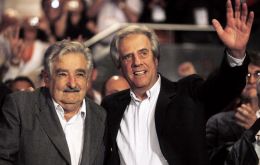
Uruguay's ruling coalition, Broad Front, is closing 2013 with a strong 44% electoral support, which is higher than all the opposition put together, according to the latest Mori public opinion poll on vote intention and support for the presidential hopefuls
-
Monday, March 11th 2013 - 05:06 UTC
Uruguay defence minister blasts Uruguayan observers at Falklands referendum
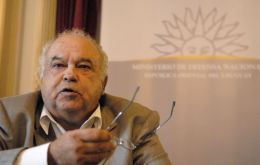
Uruguay Minister of Defence Eleuterio Fernandez Huidobro described as an “enormous shame” for the country the fact that two lawmakers from the leading opposition National party travelled to the Falklands/Malvinas to participate as observers of the Sunday/Monday referendum on the Islands political status and future.
-
Monday, September 3rd 2012 - 23:49 UTC
Former president Vazquez by far the most favoured politician in Uruguay
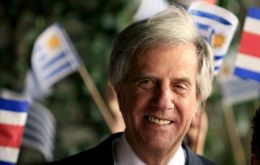
Former president Tabare Vazquez is the most popular politician in Uruguay with 65% support followed by the current head of state Jose Mujica with 50% and Vice-president Danilo Astori, 48%, according to an opinion poll from Equipos Mori and published over the weekend in the Montevideo media.
-
Tuesday, June 26th 2012 - 01:36 UTC
Uruguay will not support any kind of economic sanctions on Paraguay
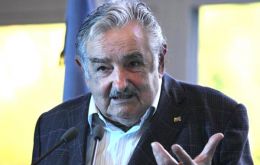
Uruguayan president Jose Mujica rejected on Monday the possibility of applying economic sanctions on Paraguay following on the “parliamentary coup” as was announced by Venezuela which decided to cut the supply of subsidized oil.
